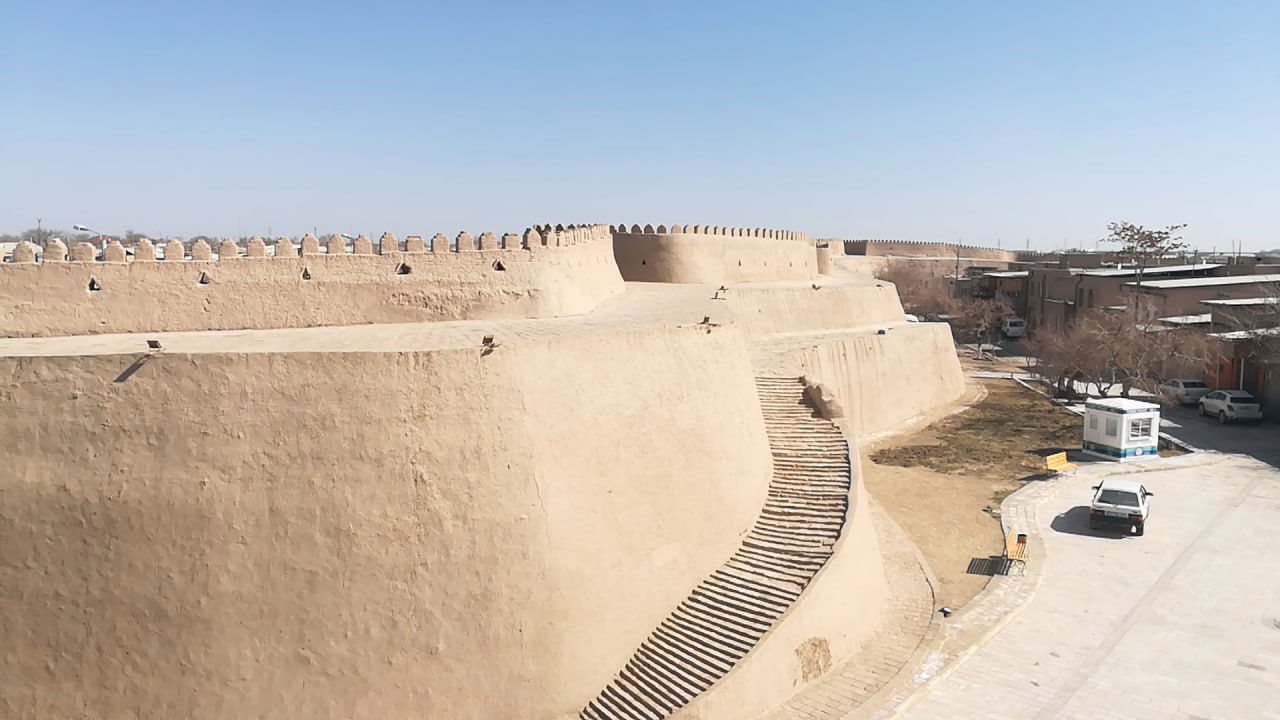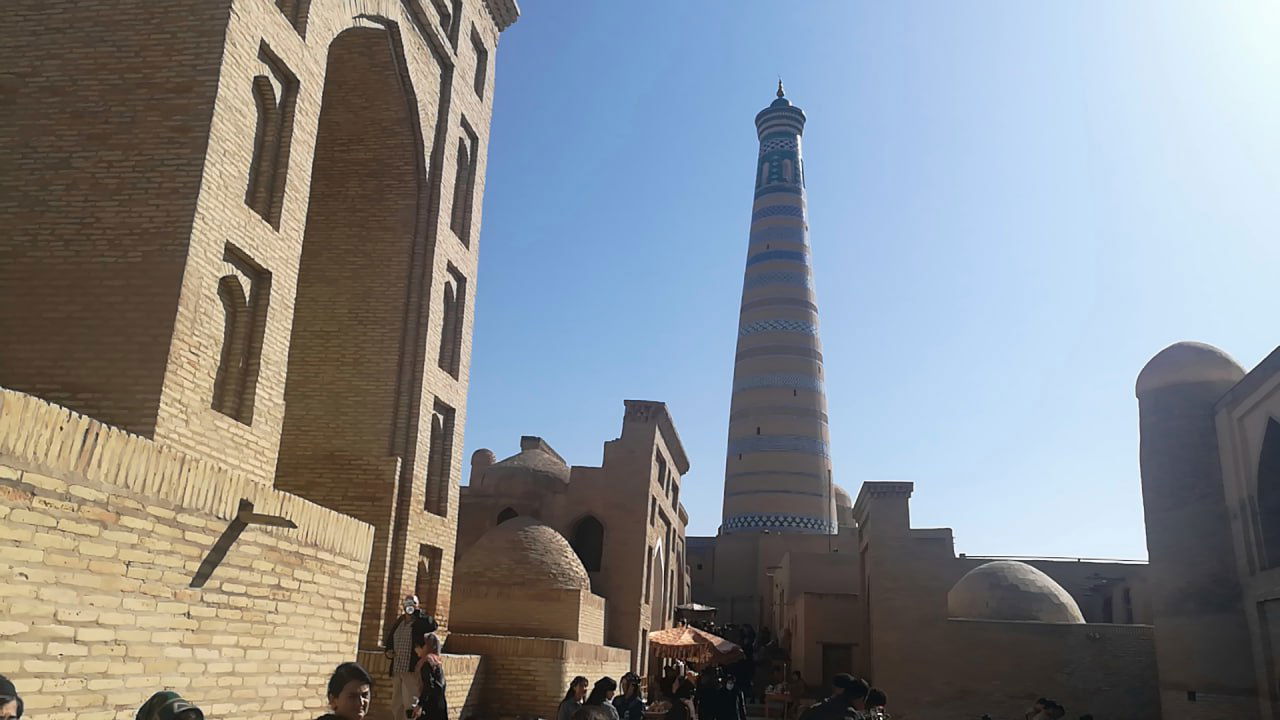Day Trip to Khiva
The 8th of March is International Women’s Day, which gave us the much-welcomed gift of a long weekend. Dave and I decided to use this extra day to visit Khiva. The Old Town of Khiva, infamous for its slave trade, is separated from modern development by a well restored, fortified wall which dates back to the 10th Century. It is as significant to the history of the Silk Road as Samarkand and Bukhara but, because of its geographical location, it’s not as easy to reach, so many tourists decide to skip it without ever realizing what they are missing. Nukus is only 2.5 hours by car from Khiva, so the visit can be easily managed in one long day.

There is another Presidential school in Khiva, with its own cohort of International vagabonds. I thought that our trip could also be a fun opportunity to connect with some of them, exchange stories, share some laughs at our mishaps, and maybe get a tip or two about where to get some good shashlik. I contacted my English Coordinator in Tashkent and got a phone number for my counterpart in Khiva, a guy named Steve. I tried to call him several times but never managed to connect. Steve was unavailable, so I looked up a few good eating places myself and forgot about him.
Sunday turned out to be a perfect day for a trip, with a morning of blue sky and a balmy 8 degrees. Our driver did not speak any English so, instead of a conversation, we resigned ourselves to listening to his Uzbek music. At the start, while still traveling through Nukus, it was nice to recognize some now familiar landmarks.
“Oh, that’s the place where we had that amazing steak,” Dave would say. Five minutes later I would counter, “Look to the right. Didn’t we go there with Richard? I think they have really good bread there.”
Some people get to know new cities by their historical places. Some opt for restaurants. It’s quite obvious into which category Dave and I fall. Our last known landmark was a place that served my soup with a long, black hair at no extra charge. After we passed that ‘memorable’ place we entered Terra Nova.
Nukus sits in the middle of a very flat desert enlivened only by low and, at this time of year, dry shrubs. The scenery changed thirty minutes into our journey, when we entered countryside using Amudarya River water for agriculture. We passed vast areas covered with industrial-sized green houses and extensive fields bordered by ditches that are part of the irrigation system utilizing the Amudarya’s valuable water.
The Amudarya is the longest river in Central Asia, originating in the glaciers of Pamir in Afghanistan. Even though English doesn’t assign any gender to objects as many languages do, I think of the Amudarya as ‘she.’ I love her name. Amudarya sounds so exotic, evoking images of a magnificent river flowing unchecked through the countryside. It appeals to the romantic in me, even though I knew from my prior readings that the reality would be different. In the past, her water used to reach the Aral Sea. Alas, no more. Years of diverting her waters for agriculture has resulted in the drying of the Aral Sea, where her parched delta is now a sad reminder of human mismanagement of natural resources.
Dave had already traveled part of the road during one of his pedagogical tours to a rural school and, when he recognized the road, he became very excited about the fact that we would be forced to cross the Amudarya the way he had done earlier.
Living in the age of technology, our environment is mostly devoid of any real danger. Without any large mammals, besides other humans, that would require us to occasionally sprint away to safety, we are more or less left to our imaginations when it comes to potential danger. That’s probably why we have so many horror blockbusters and amusement park rides that seemingly defy the laws of physics. Given this lack of danger, we dwell on any potential harm that could come our way. I think that’s why Dave had regaled me for days on end with his story of the crossing of the bridge over the Amudarya. Each time he retold the story, the bridge would become longer and more dilapidated, giving me the distinct impression that I should consider myself lucky to have him back from that trip in one piece. Secretly, listening to him, I thought he probably exaggerated a bit. I was wrong. The sturdy rock and mortar bridge had been swept away by floating ice several years ago and, as a temporary measure, a new bridge resting on pontoons had taken its place. When our car entered the bridge, I resorted to my usual mantra that I use when I fly; “The crew does this every day, so we will probably land safely.” In the same vein, I kept telling myself all the way across the bridge that, if it had lasted this long, it would probably hold one more time for one more car.
One of the biggest attractions in the Old Town of Khiva, touted by the guidebooks, is the 45-meter tall Islam-Hoja minaret; the tallest minaret in Uzbekistan. When perceived horizontally, it’s not even half the length of a soccer field, I told myself. It’s certainly doable, I am in a pretty good shape, I reasoned. What I did not count on was the stairs being twice the height of regular stairs, forcing me to occasionally use my hands on my way up. I am convinced that, had this minaret been in the States, with the American propensity to sue at the drop of a hat, the people would be asked to sign a safety waiver before allowing them to climb, absolving the operator of any responsibility for mental or physical harm potentially incurred while engaging in this hazardous endeavor. And there was a lot of potential. The spiraling staircase was so narrow that, when meeting a person going in the opposite direction, the more faint-hearted would be forced to flatten against the wall to allow for passage. This was not a friendly place for well-endowed women, reminding me why I hate mammograms. For days afterwards, every time I recalled the climb or wanted to squat, my legs would become wobbly and I would feel the urge to check my chest.

After that 20 minutes of harrowing terror, I was ready to sit down somewhere for a cup of coffee. Earlier, on our way to the minaret, we had passed a decent looking café, so we retraced our steps and went in. The place was moderately busy, but one guy stood out right away with his receding but still recognizably blond hair. It’s easy to stand out in a land of Asian-looking people. The guy had an empty cup of coffee and some papers and a laptop spread out in front of him. While passing his table, I stopped and asked, “Hi, is the coffee any good here?” After he told us that it was one of the better places in Khiva we continued to chat, which led to the inevitable, “So what do you do here in Khiva?” He hesitated and then said, “Well, I work at this new school.”
I don’t think I even let him finish. “Your name wouldn’t happen to be Steve?”
He looked at me incredulously and nodded. If that is not serendipity, I don’t know what is.